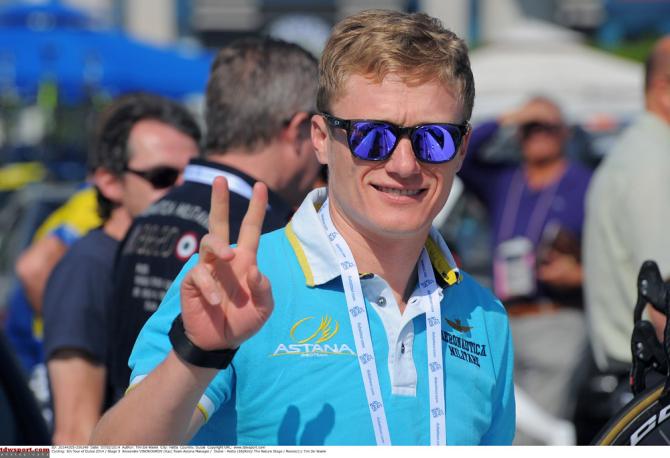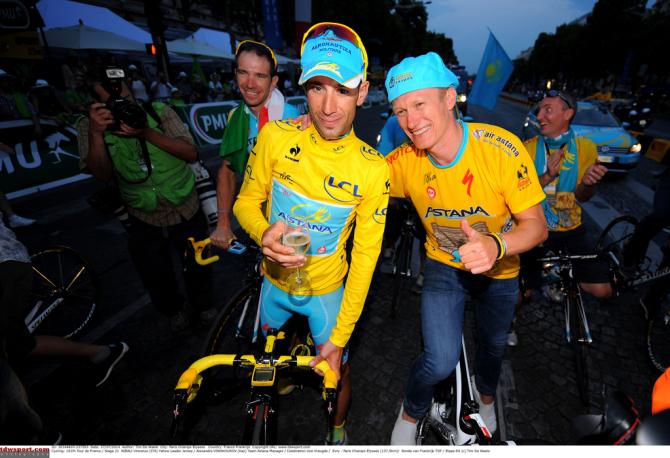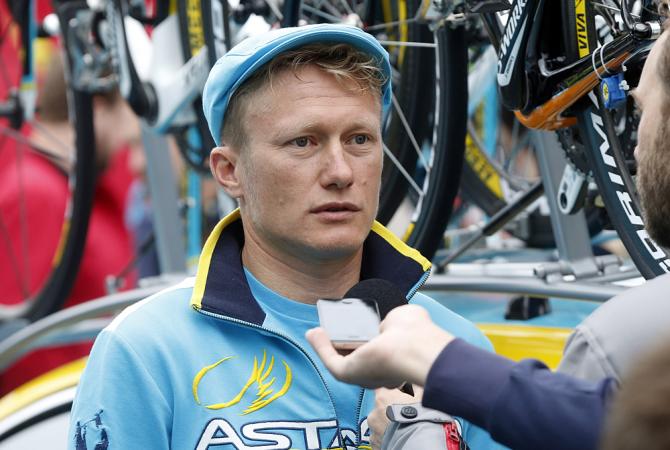Vinokourov to meet with Cookson following Iglinskiy positives
Astana manager to answer questions from UCI president



Astana general manager Alexandre Vinokourov will meet with UCI president Brian Cookson to offer an explanation for Valentin and Maxim Iglinskiy’s recent positive tests for EPO. The UCI has stated that the case has “raised questions” about Astana’s management and suggested that the team could have to meet certain conditions to retain its WorldTour licence for 2015.
“The threat that Astana will be left without a WorldTour licence is always there, but it’s the same for the other teams. Although we have a licence for three years, at the end of every season, we need to provide guarantees of our finances. And with this case, I won’t deny it, we have additional hassles,” Vinokourov told Kazakh website vesti.kz, although he added that it was “quite a normal procedure.”
The UCI, however, confirmed that the Licence Commission will be in facilitating discussions with the team, and not Cookson directly.
Valentin Iglinskiy tested positive at the Eneco Tour in August and was handed a four-year ban by the Kazakh federation when he immediately confessed to doping after news of the case broke in September. His older brother Maxim Iglinskiy’s positive test dated from the eve of the Clasica San Sebastian but the result was not announced until October 1.
“No one can tell how this even happened. It is a shock for all of us. All the riders of the Astana Pro Team must unfailingly follow the ethical requirements and obligations of their contracts. I was extremely disappointed and outraged at the fact that Maxim did not understand the importance of following these rules. The rules are for everyone regardless of their position within the team or nationality,” said Vinokourov – who himself tested positive for a homologous blood transfusion at the 2007 Tour de France and was later suspended for two years. He declined to discuss the case when asked about it during this year’s Tour, won by Astana’s Vincenzo Nibali.
Vinokourov claimed that the Iglinskiy brothers had been part of the team’s internal testing programme at the WADA-accredited laboratory in Orbassano, near Turin, but said that no anomalies had been discovered. He added that they would be questioned by the Kazakh Cycling Federation on the matter. He said that he had not yet spoken face-to-face with Maxim Iglinskiy, who raced as a trainee with Vinokourov's T-Mobile team in late 2004 and later joined his fellow countryman at Astana in 2007, its first full season in operation.
“I haven’t seen him but there was a telephone conversation with him,” Vinokourov said. “He regrets it and is aware that he has damaged the leadership of Kazakh cycling and me as team manager. He refused to seek a B-sample and admitted his guilt. Maxim and Valentin did it of their own initiative.”
The latest race content, interviews, features, reviews and expert buying guides, direct to your inbox!
Under the rules of the MPCC [Movement for Credible Cycling], Astana suspended itself from racing for eight days following its second positive test within a twelve-month period. The five-day delay between the initial news of Maxim Iglinskiy’s positive and his decision not to seek a counter-analysis, however, meant that the team was able to compete in its home race, the Tour of Almaty, and instead missed the Tour of Beijing, as well as the Giro dell’Emilia and GP Beghelli.
“With two positive cases in less than one year, we had to suspend the team for eight days, and these dates just fell during the Tour of Beijing,” Vinokourov said. “We did this to show our willingness to fight hard against any violations, despite the fact that this decision was not profitable for us economically.”

Barry Ryan was Head of Features at Cyclingnews. He has covered professional cycling since 2010, reporting from the Tour de France, Giro d’Italia and events from Argentina to Japan. His writing has appeared in The Independent, Procycling and Cycling Plus. He is the author of The Ascent: Sean Kelly, Stephen Roche and the Rise of Irish Cycling’s Golden Generation, published by Gill Books.